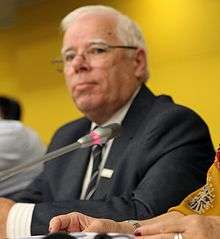Alejandro Betts
| Alejandro Betts | |
|---|---|
 Alejandro Betts at the meeting of the UN Special Committee on Decolonization in 2011. | |
| Born |
Alexander Jacob Betts October 28, 1947 Stanley, Falkland Islands |
| Nationality | Argentine |
| Known for | Campaigning for Argentine sovereignty over the Falkland Islands |
Alexander Jacob Betts Goss (also known as Alejandro Betts; born 28 October 1947 in Stanley, Falkland Islands) is a Falklands-born Argentine air-traffic controller and historian who currently works with the Argentine government as a Technical Advisor on the Tierra del Fuego Malvinas Question Provincial Observatory Advisory Council. Betts is notable for being one of the only Falkland Islanders to support Argentina's claim to the Falkland Islands and is a controversial figure in the Falklands as a result. Betts also is the older brother of Terry Betts, who served as a member of the Falkland Islands Legislative Council.[1]
Early life
Betts, a fourth generation Falkland Islanders, was born to Cyril Betts and Mally Goss who ran the Victory Bar in Stanley. At the age of fourteen Betts went to train as sheep shearer and later worked for LADE as an air-traffic controller at Stanley Airport. Betts' first wife, Candy, died in 1977 at the age of 26. The couple had one daughter, Dawn, born in 1969. Betts' second marriage was to Rosita, a Chilean-Falkander, with whom he had two children.[1]
Betts claims that he began to question British sovereignty over the Falklands when he spoke to an Argentine tourist about the issue in the 1970s. He started studying the history of the Falkland Islands in 1976, concluding after two years of research that "Argentina had absolute rights over the island territory".[2]
Falklands war
Following the Argentine invasion of the Falklands in 1982, Betts left the Falklands a few days after the Argentine surrender, with his wife and children remaining on the islands.[1]
The reasons and circumstances surrounding Betts' departure from the Falklands are disputed. Betts claims he was forced to leave by British forces, with the support of many Falkland Islanders, as a result of his support for Argentina during the war.[1][3] However, John Fowler, the former deputy editor of Penguin News, claims Betts left the Falklands of his own accord, abandoning his wife and children, because he was having an extramarital affair with an Argentine maid whom he had met when working with LADE.[4][5] Fowler pointed out that other islanders who had worked closely with the Argentine military during the war suffered no persecution and still live in the islands.[4] Betts' claim that he had supported Argentine sovereignty over the islands as early as 1976 is also disputed.[5] On 18 May 1978 Betts sent a letter to the Falkland Islands Times, strongly protesting the weak response of the British government to the establishment of an Argentine base on Thule Island.[5]
Life in Argentina
After leaving the Falklands, Betts moved to Córdoba Province and married his Argentine partner, Caroline.[1] In 2007 Betts unsuccessfully ran for Mayor of Córdoba.[6]
Betts has continued to campaign in support of Argentine sovereignty over the Falklands, giving evidence at annual meetings of the United Nations Special Committee on Decolonization as part of Argentina's delegation.[7] In late 2013 Betts was made a technical advisor of the Tierra del Fuego Malvinas Observatory.[8]
In his evidence to the Special Committee's meeting in 2013, Betts caused controversy when he suggested that during the Falkland Islands sovereignty referendum campaign, Peter Willets, an Emeritus Professor of Global Politics from City University London, had his credentials as an official referendum observer removed by the Falkland Islands Government because he stated the referendum result would not be recognised legally.[5] Peter Willets later strongly condemned Betts' comments as a "highly distorted account" and stated that "I object to my activities being misrepresented to sustain Mr Betts misrepresentation of his own background."[5]
In 2015 Clarín criticised Betts for receiving a war veteran's pension from the Argentine government despite the fact he was never a member of the Argentine military and wasn't an Argentine citizen at the time of the war.[9] Betts responded to the article by pointing out that he had "never denied being an Argentine Malvinas war veteran" and that one of the requisites to collect the veteran's pension is to have been in the Falklands during the war.[10]
References
- 1 2 3 4 5 Sherwood, Deborah (2007). "Three brothers in Port Stanley. Three brothers in Port Stanley. Two helped the Brits, the other sided with the Argies.". TheFreeLibrary.com. Retrieved 2014-08-08.
- ↑ "Un malvinense contra Inglaterra". Clarín (in Spanish) (fundacion-malvinas.org.ar). 22 June 2011. Retrieved 2014-08-08.
- ↑ Usborne, David (10 March 2013). "Falklands referendum: Why ask British people if they want to be British?". The Independent. Retrieved 2014-08-08.
- 1 2 Fowler, John (12 December 2012). "El Penguin News responde a Alejandro Betts". Penguin News (in Spanish) (malvinense.org.ar). Retrieved 2014-08-08.
- 1 2 3 4 5 Willets, Peter (30 July 2013). "Falklands at C24: ‘Alejandro Betts misrepresents’, says Professor Willets". Penguin News (MercoPress). Retrieved 2014-08-08.
- ↑ "Former Islander running for mayor in Cordoba village". MercoPress (MercoPress). 29 January 2007. Retrieved 2014-08-08.
- ↑ "Malvinas C24 Argentina petitioners: Maria Angelia Vernet and Alejandro Betts". MercoPress (MercoPress). 19 June 2013. Retrieved 2014-08-08.
- ↑ "Alejandro Betts, technical advisor of Tierra del Fuego Malvinas Observatory". MercoPress (MercoPress). 11 December 2013. Retrieved 2014-08-08.
- ↑ Niebieskikwiat, Natasha (2015-07-01). "Polémica pensión como veterano de guerra para un kelper". Clarín (in Spanish) (Buenos Aires). Retrieved 2015-07-06.
- ↑ "Alejandro Betts' Malvinas veteran pension turns into controversy". MercoPress (Montevideo). 2015-07-04. Retrieved 2015-07-06.